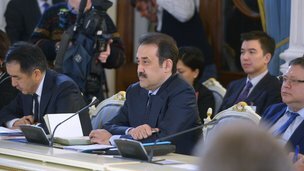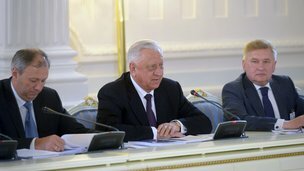Press releases
Meeting of heads of government of Russia, Belarus and Kazakhstan

15 April 2014, Reception House of the Russian Government, Moscow
Dmitry Medvedev’s opening remarks at the meeting of the prime ministers of Russia, Belarus and Kazakhstan:
Good afternoon. We quickly organised this meeting of the prime ministers of the Common Economic Space (CES) in Moscow to discuss current issues, including a very important one – a draft treaty on the Eurasian Economic Union.
Our countries are moving towards the formation of this union. We’ve formed a common customs territory and introduced CES framework agreements. A substantial number of our national powers have been transferred to our partners from the organisation’s supranational body, the Eurasian Economic Commission (something we are still getting used to). Now we are proceeding to an even higher level of integration. Our cooperation in this trilateral format has produced concrete results, such as fewer trade barriers, which can partially make up for the reduction of external demand and alleviate some of the consequences of the financial crisis.

Dmitry Medvedev: "Our countries are moving towards the formation of this union. We’ve formed a common customs territory and introduced CES framework agreements. A substantial number of our national powers have been transferred to our partners from the organisation’s supranational body, the Eurasian Economic Commission (something we are still getting used to). Now we are proceeding to an even higher level of integration."
Last year trade within the Customs Union exceeded $64 billion, which is an impressive figure. But the institutional changes are no less important. The terms of the CES have given businesses the opportunity to locate in places where there are fewer administrative barriers and it is easier to do business. At first glance, this may not seem good for our national interests. However, in the context of the CES, this represents real competition between jurisdictions, which was our goal.
 Talks continue on the accession of Armenia and Kyrgyzstan to our union. Our colleagues from these countries have done much to become fully-fledged participants in the integration process. As for the treaty, it should be ready for signing this May, so all negotiating teams need to work hard. We’ve made progress in our effort to coordinate this complicated and lengthy document both in the Government and the Eurasian Economic Commission. The business community actively participated in our discussion. We were able to reach a compromise on most issues and I hope we’ll continue our work in the same vein.
Talks continue on the accession of Armenia and Kyrgyzstan to our union. Our colleagues from these countries have done much to become fully-fledged participants in the integration process. As for the treaty, it should be ready for signing this May, so all negotiating teams need to work hard. We’ve made progress in our effort to coordinate this complicated and lengthy document both in the Government and the Eurasian Economic Commission. The business community actively participated in our discussion. We were able to reach a compromise on most issues and I hope we’ll continue our work in the same vein.
I’d like to point out on Russia’s behalf that we’ll consider all the wishes of our partners and try to take their interests into account as much as we can. We’ve met them halfway in adopting common rules of access to the services of natural monopolies in electric power and the transport of gas, oil and oil products. We’ve agreed to draft indicative balances of gas, oil and oil products and accepted additional exemptions on several sensitive issues.
Dmitry Medvedev: "Last year trade within the Customs Union exceeded $64 billion, which is an impressive figure. But the institutional changes are no less important. The terms of the CES have given businesses the opportunity to locate in places where there are fewer administrative barriers and it is easier to do business. At first glance, this may not seem good for our national interests."
At any rate, we generally proceed from the premise that to achieve results we must work hard and be ready to compromise and find mutually acceptable solutions. I hope that the governments of our three countries and the Eurasian Economic Commission will work in the same spirit. Experts should complete their work on the draft treaty, which requires some finishing touches. We believe it is necessary to impose a moratorium on new proposals and complete the work on the text of the treaty. This is the position of the Russian delegation.
Now I’d like to give the floor to Mr Myasnikovich (Mikhail Myasnikovich, Prime Minister of Belarus). But before I do, I’d like to welcome again, on his and my behalf, Mr Massimov (Karim Massimov, Prime Minister of Kazakhstan) and his new Government and to express our shared desire to work together. We wish all of you, and Mr Massimov personally, success in reaching Kazakhstan’s national goals. Thank you.























